Shaping the Future of Technology
Shaping the Future of Technology: Intelligence (AI) is advancing at an unprecedented pace, driving innovation across industries and transforming the way we live and work. From breakthroughs in natural language processing to advancements in ethical AI, the field is evolving rapidly. In this article, we’ll explore the latest AI trends and research, highlighting key developments and their potential impact on the future.
Why AI Trends and Research Matter
AI is not just a technological trend—it’s a paradigm shift that is reshaping industries, economies, and societies. Staying updated on AI trends and research is crucial because:
- It drives innovation: New discoveries and techniques push the boundaries of what’s possible.
- It informs decision-making: Businesses and policymakers rely on AI research to make strategic choices.
- It addresses challenges: Research helps tackle ethical, social, and technical issues in AI development.
Top AI Trends to Watch in 2025 and Beyond
1. Generative AI and Creative Applications
Generative AI, which includes tools like ChatGPT, DALL·E, and MidJourney, is revolutionizing creativity by generating text, images, music, and even code.
- Example: ChatGPT is being used for content creation, customer support, and coding assistance.
- Impact: This trend is democratizing creativity and enabling new forms of artistic expression.
2. Multimodal AI Models
Multimodal AI models can process and generate multiple types of data, such as text, images, and audio, in a unified framework.
- Example: OpenAI’s GPT-4 and Google’s Gemini are pushing the boundaries of multimodal capabilities.
- Impact: These models enable more human-like interactions and open up new possibilities for AI applications.
3. AI in Healthcare
AI is transforming healthcare with applications like drug discovery, medical imaging, and personalized medicine.
- Example: DeepMind’s AlphaFold is revolutionizing protein structure prediction, accelerating drug development.
- Impact: AI is improving diagnostics, reducing costs, and saving lives.
4. Ethical and Responsible AI
As AI becomes more pervasive, there’s a growing focus on ethical considerations, such as bias, transparency, and accountability.
- Example: Researchers are developing frameworks for explainable AI (XAI) to make AI decisions more transparent.
- Impact: Ethical AI ensures that technology benefits society while minimizing harm.
5. Edge AI
Edge AI involves running AI algorithms on local devices (like smartphones and IoT devices) rather than in the cloud.
- Example: Apple’s on-device processing for Siri and FaceID uses edge AI.
- Impact: This trend improves privacy, reduces latency, and enables real-time decision-making.
6. AI for Climate Change and Sustainability
AI is being used to address global challenges like climate change, energy efficiency, and environmental conservation.
- Example: AI models are optimizing energy grids and predicting climate patterns.
- Impact: AI is helping create a more sustainable future.
7. Autonomous Systems
Advances in AI are driving the development of autonomous systems, including self-driving cars, drones, and robots.
- Example: Companies like Tesla, Waymo, and Boston Dynamics are leading the way in autonomy.
- Impact: These systems are transforming transportation, logistics, and manufacturing.
Cutting-Edge AI Research Areas
1. Reinforcement Learning (RL)
RL is a branch of AI where agents learn by interacting with their environment. Recent breakthroughs include:
- AlphaGo and AlphaZero: Mastering complex games like Go and chess.
- Real-World Applications: Robotics, supply chain optimization, and personalized recommendations.
2. Federated Learning
Federated learning allows AI models to be trained across decentralized devices while keeping data private.
- Example: Google uses federated learning to improve keyboard predictions on Android devices.
- Impact: This approach enhances privacy and security in AI systems.
3. Quantum Machine Learning
Quantum computing has the potential to revolutionize AI by solving complex problems faster than classical computers.
- Example: Researchers are exploring quantum algorithms for optimization and machine learning tasks.
- Impact: Quantum AI could unlock breakthroughs in fields like cryptography and materials science.
4. AI for Scientific Discovery
AI is accelerating scientific research by analyzing vast amounts of data and generating hypotheses.
- Example: AI is being used to discover new materials, predict protein structures, and analyze astronomical data.
- Impact: This trend is speeding up innovation and expanding the frontiers of knowledge.
How to Stay Updated on AI Trends and Research
- Follow Leading Conferences: Attend or follow conferences like NeurIPS, ICML, CVPR, and AAAI.
- Read Research Papers: Platforms like arXiv and Google Scholar provide access to the latest AI research.
- Join AI Communities: Engage with AI enthusiasts on platforms like GitHub, Reddit, and LinkedIn.
- Subscribe to Newsletters: Follow AI-focused newsletters like The Batch by DeepLearning.AI or AI Weekly.
- Experiment with Tools: Use open-source AI frameworks like TensorFlow, PyTorch, and Hugging Face to stay hands-on.
Challenges in AI Research
- Ethical Concerns: Addressing bias, fairness, and accountability in AI systems.
- Data Privacy: Ensuring that AI models respect user privacy and comply with regulations.
- Technical Limitations: Overcoming challenges like computational costs and model interpretability.
Conclusion
AI trends and research are shaping the future of technology, offering exciting opportunities and addressing critical challenges. From generative AI and ethical considerations to quantum computing and autonomous systems, the field is evolving at a rapid pace. By staying informed and engaged, you can be part of this transformative journey and contribute to building a better future with AI.
The future of AI is bright, and the possibilities are endless. Are you ready to explore them?

